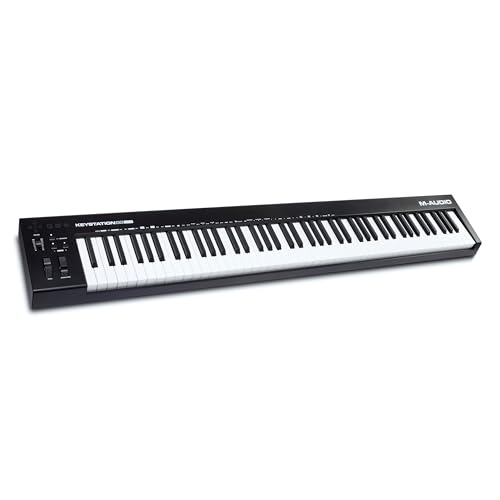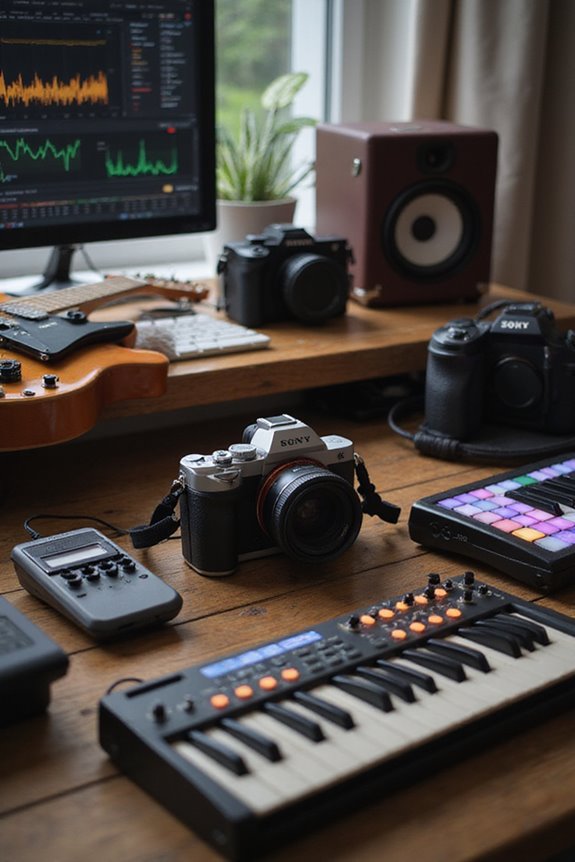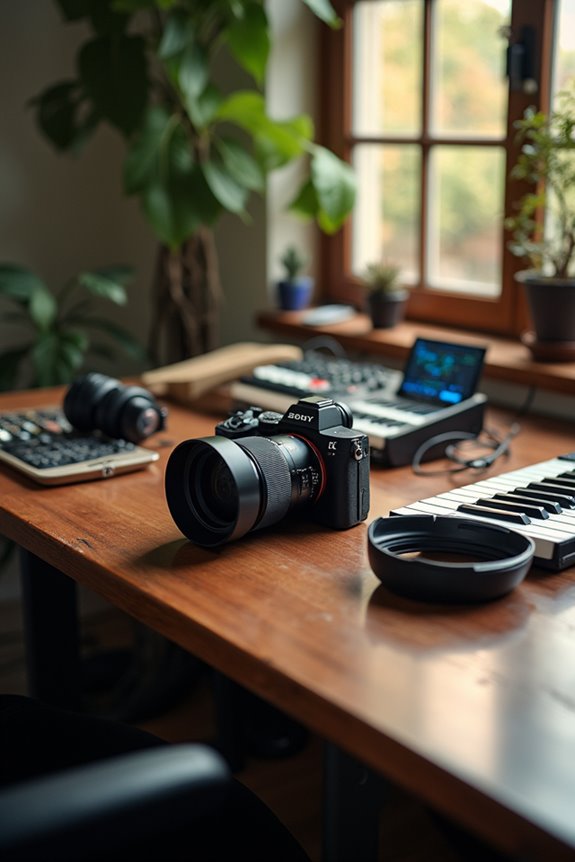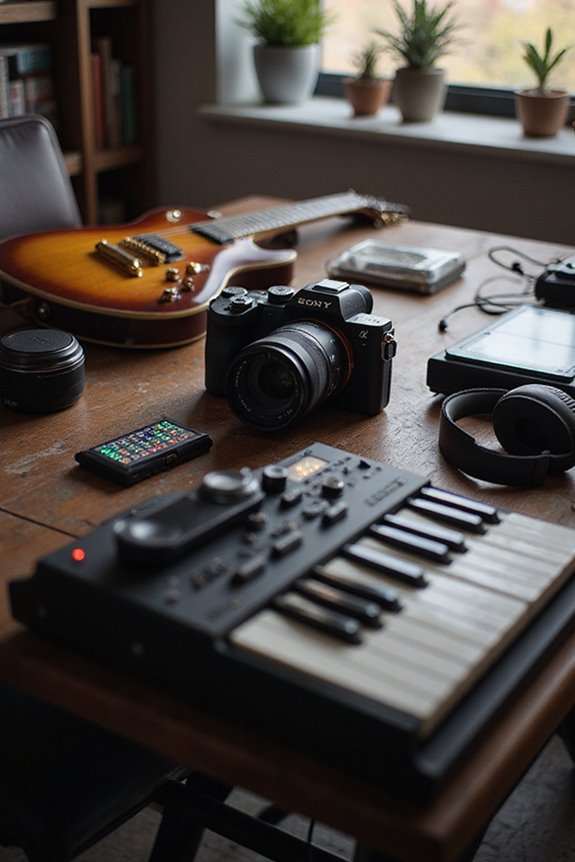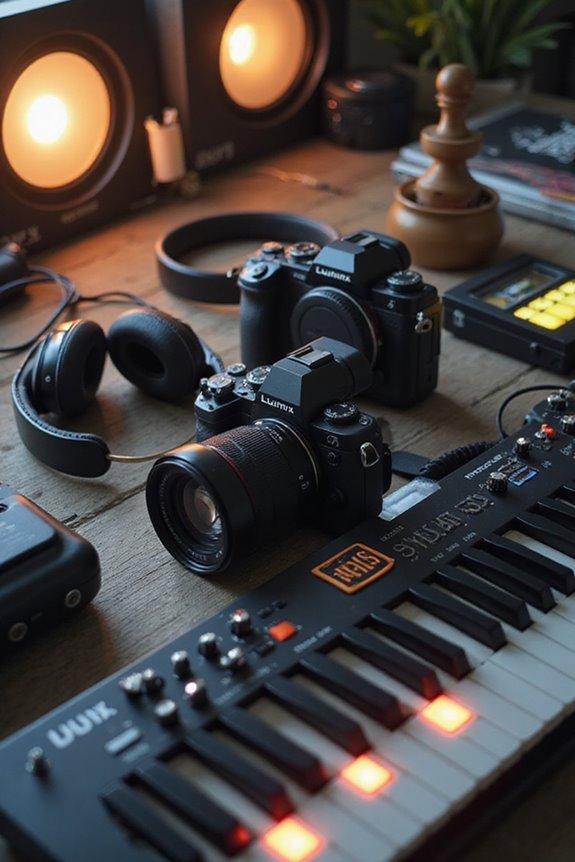As an Amazon Associate, we earn from qualifying purchases. Some links may be affiliate links at no extra cost to you. Although our opinions are based on curated research, we haven't used these products. Articles generated with AI.
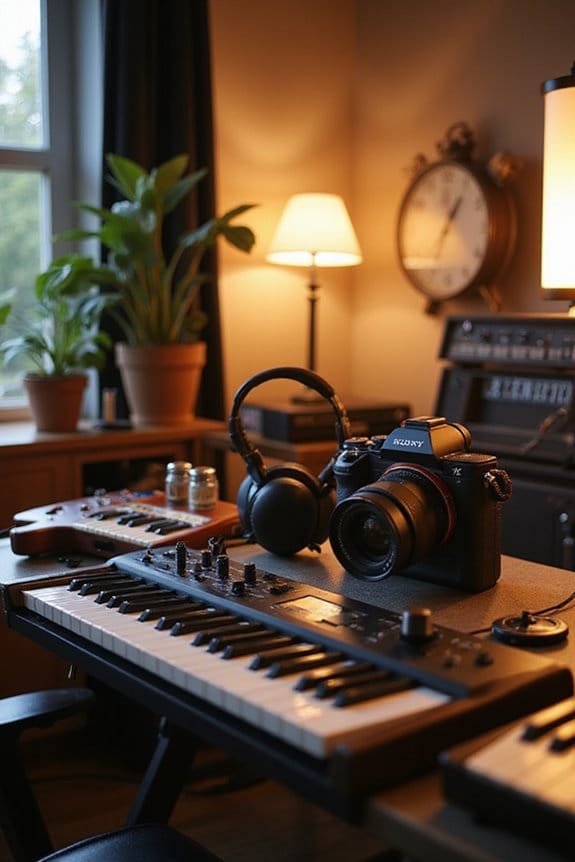
The 7 Best Weighted Key MIDI Controllers for Musicians in 2025 – Play Like a Pro
If you’re serious about your music in 2025, you need a weighted key MIDI controller that enhances your performance. The M-Audio Keystation 88 MK3 offers 88 semi-weighted keys and great DAW integration. The Novation Launchkey 61 MK4 is perfect for portability with its 61 keys and polyphonic aftertouch. Don’t overlook the Arturia KeyLab Essential 88 mk3 or the Nektar Impact GXP88 for more expressive options. Keep reading to discover even more choices that can elevate your sound.
Key Takeaways
- Look for controllers with fully weighted keys for realistic piano feel, ideal for serious musicians and performance settings.
- Evaluate build quality and key sensitivity to ensure durability and responsive playability during practice and performances.
- Consider MIDI controllers with seamless DAW integration for efficient workflow and enhanced music production capabilities.
- Explore options with additional features like assignable knobs and pads that allow for real-time control over various parameters.
- Ensure the MIDI controller is portable and fits your transport needs, making it easy to practice or perform on the go.
M-Audio Keystation 88 MK3 MIDI Keyboard Controller
M-AUDIO Keystation 88 MK3 88 Key Semi Weighted MIDI Keyboard Controller for Complete Command of...
- Music Production Essential - MIDI keyboard controller with 88 full-size velocity-sensitive semi weighted keys for MIDI control of virtual instruments, software samplers...
- MIDI Keyboard Must-Haves - Volume fader, transport and directional buttons; Pitch and modulation wheels, octave up and down buttons and sustain pedal input for expressive...
- Immediate Creativity - Effortless plug-n-play USB connectivity to Mac or PC-no drivers or power supply required; compatible with iOS devices via the Apple to USB Camera...
If you’re a musician seeking a versatile, expressive MIDI controller, the M-Audio Keystation 88 MK3 is a stellar choice. This 88-key, semi-weighted keyboard captures every nuance of your performance with velocity-sensitive keys, allowing you to play expressively. You’ll appreciate the included volume fader, transport buttons, and pitch/modulation wheels for seamless DAW control. Plus, its slim design fits nicely in any setup—be it at home or on stage. Connecting via USB is a breeze, meaning you can start creating music quickly, without needing extra drivers. Immerse yourself in your creative process right away with bundled software like Ableton Live Lite!
Best For: Musicians and producers looking for an affordable, expressive MIDI keyboard controller with a range of features for DAW integration and virtual instruments.
Pros:
- Expressive Performance: 88 full-size, velocity-sensitive keys capture nuances in playing.
- User-Friendly: USB plug-and-play setup makes it easy to start creating music without additional drivers.
- Included Software: Comes with a variety of professional virtual instruments and software for immediate music production.
Cons:
- Dynamic Range Limitations: Some users report fewer velocity layers compared to other models, affecting expressive capabilities.
- Software Setup Required: Activation and additional software setup can be cumbersome for some users.
- Build Expectations: The semi-weighted keys may not meet the expectations of all users regarding performance feel.
Novation Launchkey 61 MK4 MIDI Keyboard Controller
Novation Launchkey 61 MK4 – 61 key Semi-Weighted, USB, MIDI Keyboard Controller with DAW...
- The Creative Controller: Launchkey is an all-in-one DAW controller with premium keybeds and 16 responsive FSR pads for drumming, clip launching, and more
- Seamless DAW Integration: Launchkey works with all major DAWs, offering intuitive workflows for Ableton Live, Logic, Cubase, Reason, Reaper, FL Studio, and Ardour
- Go Beyond Finger Drumming: Launchkey’s FSR drum pads with polyphonic aftertouch also serve as step sequencers, clip launchers, chord triggers, and more
The Novation Launchkey 61 MK4 MIDI Keyboard Controller stands out as an exceptional choice for musicians aiming to enhance their creative workflow. This semi-weighted keyboard features 61 keys, offering you an expressive playing experience. With 16 drum pads equipped with polyphonic aftertouch, you can easily create beats or trigger clips.
Its integration with popular DAWs like Ableton Live and Logic allows seamless operation. Play around with the arpeggiator and Chord Modes for quick progressions, while the OLED screen displays your current chords. Weighing just 10.5 pounds, it’s portable and perfect for music production on the go.
Best For: Musicians and producers seeking a versatile and portable MIDI controller for enhancing their creative workflow.
Pros:
- Excellent semi-weighted keybed for expressive playing.
- Seamless integration with major DAWs and intuitive workflows.
- Lightweight and portable design makes it ideal for music production on the go.
Cons:
- Some users report issues with key sensitivity.
- Privacy concerns regarding bundled software requiring multiple accounts.
- Mixed reviews about build quality and integration with less popular DAWs.
Arturia KeyLab Essential 88 mk3 USB MIDI Controller Keyboard
Arturia KeyLab Essential 88 mk3 — 88 key USB MIDI Controller Keyboard with Analog Lab V Software...
- 88-Key MIDI Controller
- Blk
For those stepping into the world of music production, the Arturia KeyLab Essential 88 mk3 USB MIDI Controller Keyboard stands out as an excellent choice. With 88 semi-weighted keys, it strikes a balance between portability and playability, making it ideal for both rapid passages and dynamic performances. The USB-C connection simplifies setup, and the included Analog Lab V software opens a world of virtual instruments right at your fingertips.
It’s lightweight at just 18.1 pounds, making it easy to transport. Though some may notice feedback about keybed quality, it generally offers good value for aspiring electronic music producers.
Best For: The Arturia KeyLab Essential 88 mk3 is best for beginners and electronic music producers seeking an affordable and portable MIDI controller with decent playability.
Pros:
- Solid build quality with ease of setup for hassle-free music production.
- Semi-weighted keys provide a good feel for dynamic playing and rapid passages.
- Lightweight design at 18.1 pounds enhances portability for on-the-go musicians.
Cons:
- Requires a computer to operate, limiting standalone use.
- Some users report concerns about the quality of the keybed.
- Lack of aftertouch may be a drawback for expressive playing styles.
Nektar Impact GXP88 USB MIDI Controller Keyboard
Nektar Impact GXP88 - USB MIDI Controller Keyboard with Nektar DAW Integration Black
- Expressive performance MIDI controller keyboard with 88 premium piano style semi-weighted keys + aftertouch, pitch bend and modulation wheels + octave & transpose buttons...
- Nektar DAW integration for most popular DAWs + Nektarine PlugIn Control for Instruments and Effects
- Comprehensive MIDI functionailty. Compatible with all MIDI music software applications
Musicians seeking a reliable and expressive instrument will appreciate the Nektar Impact GXP88 USB MIDI Controller Keyboard, particularly for its 88 premium semi-weighted keys with aftertouch. This controller features velocity sensitivity and real-time controls, making it perfect for live performances or studio work. You can easily manipulate pitch and modulation with dedicated wheels, while octave and transpose buttons offer extra versatility. Plus, Nektar’s DAW integration guarantees seamless compatibility with popular music software, enhancing your workflow. Weighing just over 18 pounds, it’s both portable and sturdy—ideal for musicians who perform on the go. For an affordable price, it’s hard to beat this performance.
Best For: Musicians seeking an affordable yet expressive MIDI keyboard for both live performances and studio work.
Pros:
- Excellent build quality with premium semi-weighted keys and aftertouch for expressive play.
- Seamless DAW integration enhances workflow with popular music software.
- Versatile controls including pitch bend, modulation wheels, and octave/transpose buttons for varied musical styles.
Cons:
- Noisy keybed during play, especially noticeable with softer dynamics.
- Minimal DAW control features, making it more focused on piano playing rather than extensive MIDI control.
- Some users may require technical knowledge for full MIDI functionality setup.
M-VAVE 25 Key USB MIDI Keyboard Controller
M-VAVE 25 Key USB MIDI Keyboard Controller With 8 Backlit Drum Pads, Bluetooth Semi Weighted...
- 【Powerful keyboard】 Songwriters and Beat Maker Essential - USB powered MIDI controller with 25 mini MIDI keyboard velocity-sensitive keys for studio production,...
- 【Wireless keyboard】It's very compact and portable, and you can connect it wirelessly to your device with Bluetooth, built-in 2,000 mAh battery can work for about 16...
- 【Music Production】 25 velocity-sensitive keys, 8 RGB backlit velocity-sensitive pads, 8 assignable rotary enconders, 2 Capactive touch stripes pitch bend to all your...
Experience enhanced portability and functionality with the M-VAVE 25 Key USB MIDI Keyboard Controller, a perfect companion for mobile musicians. Weighing just 2.29 pounds and measuring 12.6 x 7 x 1.8 inches, it easily fits in your backpack, making it ideal for on-the-go creativity. With 25 mini velocity-sensitive keys and 8 backlit drum pads, you can explore a variety of sounds effortlessly.
The Bluetooth connectivity allows for wireless operation, reducing cable clutter. Plus, smart chord and scale features simplify performances. With customizability and compatibility across DAWs, this controller elevates your music-making experience considerably.
Best For: The M-VAVE 25 Key USB MIDI Keyboard Controller is best for beginner and mobile musicians seeking a compact and versatile MIDI controller for music production.
Pros:
- Compact and lightweight design makes it easy to transport.
- Bluetooth connectivity enables wireless operation, reducing cable clutter.
- Smart features like chord and scale functions enhance ease of use for performance and practice.
Cons:
- Limited documentation may require additional resources for advanced configurations.
- Mini keys may not be ideal for users accustomed to full-sized keys.
- Some users might find the build quality less robust compared to higher-end controllers.
Akai Professional MPK Mini MK3 USB MIDI Keyboard Controller
Akai Professional MPK Mini MK3 25 Key USB MIDI Keyboard Controller With 8 Backlit Drum Pads, 8...
- Music Production and Beat Maker Essential -USB powered MIDI controller with 25 mini MIDI keyboard velocity-sensitive keys for studio production, virtual synthesizer...
- Total Control of your Production - Innovative 4-way thumbstick for dynamic pitch and modulation control, plus a built-in arpeggiator with adjustable resolution, range and...
- Native Kontrol Standard (NKS) Integration - Akai Professional and Native Instruments have partnered to bring NKS support to the MPK Controller series, get ready to...
Release your creative potential with the Akai Professional MPK Mini MK3, designed specifically for those venturing into the world of music production. This compact, lightweight MIDI controller features 25 velocity-sensitive keys, ideal for studio production and virtual synthesizer control. With 8 backlit drum pads and 8 assignable knobs, you can easily mix and tweak sounds on the go. Its built-in arpeggiator and 4-way thumbstick provide versatile pitch and modulation control. Although some users face setup challenges, its portability and user-friendly features make it a solid choice for budding musicians exploring their craft.
Best For: The Akai Professional MPK Mini MK3 is best for beginner musicians and aspiring producers looking for an affordable, portable MIDI controller to jumpstart their music production journey.
Pros:
- Compact and lightweight design makes it easy to transport for on-the-go music creation.
- Velocity-sensitive keys and responsive pads provide an engaging and dynamic playing experience.
- Includes bundled software and sound content, offering users essential tools for music production.
Cons:
- Setup challenges and potential compatibility issues with certain DAWs may deter some users.
- Learning curve may require patience and additional resources, such as tutorials, to fully utilize its features.
- Costs for additional sound packs can add up, limiting access to a wider range of sounds.
Nektar Impact GX49 USB MIDI Controller Keyboard
Nektar Impact GX49 | USB MIDI Controller Keyboard with Nektar DAW Integration Black
- MIDI controller keyboard compatible with all MIDI software. 49 full-size synth-action keys, pitch bend and modulation wheels + octave & transpose buttons + sustain pedal...
- Nektar DAW integration for most popular DAWs
- Comprehensive MIDI functionailty. Compatible with all MIDI music software applications
The Nektar Impact GX49 USB MIDI Controller Keyboard stands out for its ideal blend of functionality and affordability, making it a fantastic option for both aspiring producers and seasoned musicians alike. With 49 full-size synth-action keys, you’ll enjoy responsive playability that feels great whether you’re composing or performing.
Its compact design (31 x 7.5 x 2.5 inches) makes it easy to transport. Plus, it seamlessly integrates with popular DAWs like Reason and Bitwig Studio. At around $100, this controller offers exceptional value, especially given its zero latency, ensuring your music flows effortlessly. You’ll find it’s an excellent choice for any setup!
Best For: The Nektar Impact GX49 is best for both beginners and seasoned musicians looking for an affordable and versatile MIDI controller.
Pros:
- Compact design makes it easy to transport and fit into small spaces.
- Seamless DAW integration with popular software such as Reason and Bitwig Studio.
- Zero latency performance allows for smooth and responsive playability.
Cons:
- Some users report issues with velocity sensitivity, which may affect performance.
- Transport controls may require configuration for specific DAWs, like Ableton Live.
- Build quality, while good for the price, may not match that of higher-end models.
Factors to Consider When Choosing a Weighted Key Midi Controller
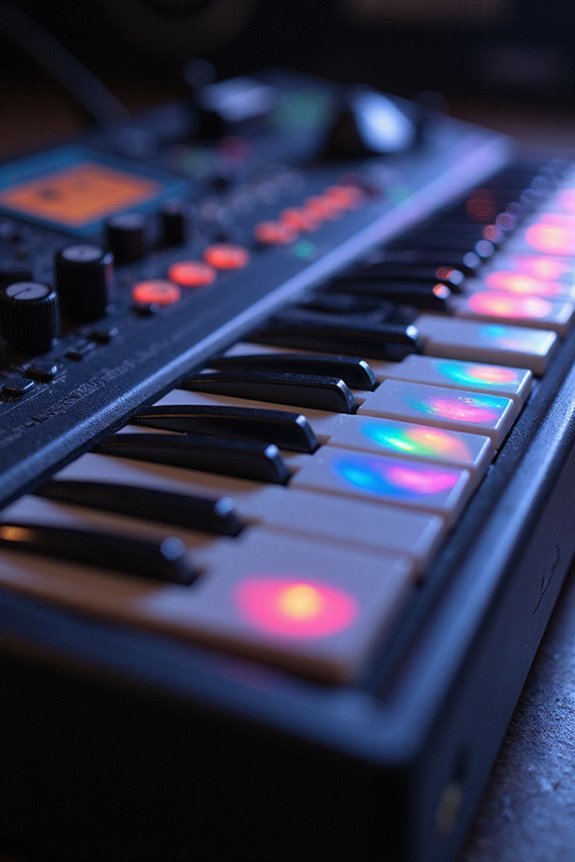
When choosing a weighted key MIDI controller, you’ll want to evaluate several key factors. Think about the type of key action that suits your playing style, the build quality for durability, and how compatible it is with your software. Also, assess its portability and size for your setup and keep your budget in mind to find the best option without overspending.
Key Action Type
Choosing the right key action type is essential for your performance experience and musical expression. Your options typically include synth-action, semi-weighted, and fully weighted keys. If you enjoy a lighter touch, synth-action might suit you, providing quick response for fast playing. Semi-weighted keys strike a balance, offering some resistance while remaining relatively portable—great for gigging musicians. If you want realism, fully weighted keys closely mimic an acoustic piano’s feel, enhancing your dynamic expression and nuance. Consider your playing style: if you favor expressive dynamics, fully weighted might be your best choice. Make sure the action type aligns with your musical goals to elevate your performance and enjoyment in every note you play.
Build Quality
Build quality plays a pivotal role in your experience with a weighted key MIDI controller, especially if you often transport your gear or perform in diverse environments. A robust controller made from high-quality plastic or metal will withstand wear and tear effectively. Look for a model with a stable keybed; this prevents wobbling and unwanted noise during dynamic playing.
Consider the controller’s weight—lighter models are easier to carry, while heavier ones offer better stability on stage. User feedback suggests that semi-weighted or fully weighted keys enhance your playing comfort and expression, mimicking a traditional piano feel. Invest in a controller with solid build quality to guarantee durability, enhance performance, and ultimately elevate your musical journey.
Software Compatibility
Although it might seem secondary, software compatibility stands at the forefront of your decision-making process when selecting a weighted key MIDI controller. First, confirm your chosen controller aligns with your preferred DAW like Ableton Live, Logic, or Cubase for seamless integration. Controllers often include tailored mappings or scripts to enhance your workflow.
If you’re a Native Instruments user, look for NKS support; it offers direct control over presets and sound libraries. Additionally, check if the MIDI controller includes bundled software which may require account creation. And if you plan on creating music on iOS devices, verify the controller’s compatibility, as some models need extra adapters. Prioritizing these considerations can greatly improve your music production experience.
Portability and Size
When considering a weighted key MIDI controller, portability and size play a significant role in your overall experience, especially if you plan to take your setup on the road. Look at the dimensions and weight of each model; for example, compact 25-key controllers typically weigh around 2-3 pounds, while 88-key versions can top 18 pounds. If you’re often on the move, a 61-key controller weighing 10-12 pounds can be a perfect compromise. Slimline designs, under 3 inches tall, store easily in tight spaces. Also, check power and connectivity options—many portable MIDI keyboards use USB plug-and-play, eliminating the need for extra gear. A robust design helps protect against damage during transport, which is vital for touring musicians.
Price Range
Finding the right weighted key MIDI controller often hinges on your budget, and it’s essential to contemplate what you expect from the device. Entry-level models start around $100, ideal for casual players. If you’re serious about music, consider mid-range options between $300 and $800, striking a balance between quality and affordability. Higher-priced models, often exceeding $2,500, deliver advanced features like aftertouch and extensive DAW integration that enhance performance. Remember, investing in a higher quality controller often means better durability and responsiveness, serving you well in the long run. Align your budget with your intended use; it’ll guide you to a MIDI controller that meets your needs without overspending.
Additional Features
In your quest for the perfect weighted key MIDI controller, don’t overlook essential features that can elevate your music-making experience. Look for velocity-sensitive keys, as they capture the nuances of your playing, enhancing expressiveness. Extra controls like pitch bend and modulation wheels can enrich your sound during live performances or studio sessions.
Additionally, assignable knobs and pads offer real-time manipulation of various parameters in your software. This is vital for dynamic music production. Also, guarantee compatibility with popular DAWs—seamless integration will streamline your workflow, making it easier to create. Finally, a solid software bundle that includes high-quality virtual instruments can greatly expand your creative possibilities right from the start. Prioritize these aspects for a truly rewarding experience!
Frequently Asked Questions
What Size MIDI Controller Is Best for Small Studio Spaces?
In a small studio, your MIDI controller‘s size is key—like choosing the perfect piece of furniture for a cozy room. A 25-key or 49-key controller often fits just right, providing enough range while saving space. Many compact models still offer weighted keys, so you won’t sacrifice feel for size. Look for ones that include built-in controls; that’ll streamline your workflow and keep your setup orderly, maximizing your creativity in limited space.
Do Weighted Keys Mimic an Acoustic Piano Feel Effectively?
Weighted keys offer a more authentic piano touch by simulating the resistance you’d feel on an acoustic piano. When you press down on these keys, it engages a similar action, making your playing feel more expressive. For instance, if you’re practicing dynamics or playing classical pieces, these keys help develop your technique effectively. So, if you want a realistic experience, opting for a weighted key MIDI controller is a smart choice.
Are MIDI Controllers Compatible With All Digital Audio Workstations?
Imagine diving into a buffet—each digital audio workstation (DAW) is a different dish. Most MIDI controllers are designed to work across a wide range of DAWs, including popular options like Ableton Live and Logic Pro. You’ve got to check the controller’s specifications for any limitations, but using USB for connection generally guarantees a seamless experience. This versatility lets you focus on creating music, not troubleshooting compatibility issues. Enjoy the feast!
How Do I Connect My MIDI Controller to External Speakers?
To connect your MIDI controller to external speakers, you’ll typically use audio output. First, plug your controller into your computer via USB, then use an audio interface or sound card for your speakers. If your MIDI controller has line outputs, connect those directly to your speakers using TRS cables. Adjust your DAW’s output settings to guarantee the sound routes through the external speakers. This setup enhances your audio experience considerably!
Can I Use a MIDI Controller for Live Performances?
Absolutely, you can use a MIDI controller for live performances! Many musicians rely on these versatile tools to trigger sounds, control effects, and create a dynamic show. For instance, you can assign different pads to activation routes for drum sounds or synth leads. Setting up your controller through software like Ableton Live or Logic Pro enables real-time manipulation, giving you the freedom to engage your audience fully while performing.

